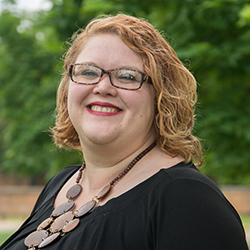 By Jo Bair Springer
By Jo Bair Springer
2016 BJC Fellow
I am proud to be a Baptist. That is not something I’ve said often, but that is changing due to my time as a 2016 Fellow with the Baptist Joint Committee for Religious Liberty (BJC). As a BJC Fellow, I spent four days in Colonial Williamsburg studying the theological, historical, and legal basis of religious liberty. This time included learning from the BJC staff, lectures by constitutional scholar Michael Meyerson, and meeting historic interpreters. I came away from this time proud of my Baptist heritage and eager to share the stories of the early American Baptists.
In Colonial America, Baptists experienced persecution from the religious establishment. This persecution served to solidify the Baptist commitment to religious liberty, not only for themselves, but for all humankind. Brent Walker spoke on the Baptists as “a biblical people committed to religious liberty for all” and outlined the biblical and theological predicates for this position. He noted that we cannot go to proof texts, but must rather consider the “pervasive principles, inferences, and suggestions throughout the Bible” that God has created humankind to be free.
Two early Baptists visited our class by way of historic interpreters. Fred Anderson from the Center for Baptist Heritage and Studies portrayed John Leland. Leland was a traveling Baptist minister who gained the ear of James Madison and Thomas Jefferson. The fruit of their interactions is shown within the founding documents of our nation.
Leland and other early Baptists believed that soul freedom was a gift of God, not something which could be bestowed or removed by the state. Therefore, they were unwilling to settle for toleration when God had given them liberty. At the same time, Baptists did not seek liberty for themselves alone, nor for an exalted place for Christianity within the nation.
To this point, Leland wrote, “The notion of a Christian commonwealth should be exploded forever […] Government should protect every man in thinking and speaking freely, and see that one does not abuse another. The liberty I contend for is more than toleration. The very idea of toleration is despicable; it supposes that some have a pre-eminence above the rest to grant indulgence, whereas all should be equally free, Jews, Turks, Pagans and Christians.”
I found listening to James Ingram Jr. as Gowan Pamphlet to be one of the most compelling parts of my time in Virginia. I had never heard of Pamphlet before and his story of faithfulness brought me to tears. Pamphlet was both a slave and one of the earliest ordained black preachers. By 1791, two years before he was emancipated, his church had grown to 500 people. The cornerstone of Pamphlet’s message was the belief in the equality of humankind.
As a BJC Fellow, I see myself as part of the legacy of people like Leland and Pamphlet, who worked for liberty and equality. But their stories are not enough. The work is not done. Religious liberty, according to Dr. Meyerson, is an ongoing process which each generation must continue to advance. It is not linear. Progress is fleeting. Walker reminded us that every liberty is within one generation of being lost. It is now our turn to defend the liberty so many suffered to secure.
As we move into a post-Christendom era, our Baptist fathers and mothers have much to teach us about speaking from the margins. Their influence, including influence upon government, did not come from social status or power. Rather, it was by enduring persecution that Baptists helped win soul liberty for the entire nation.
Read other reflections from BJC Fellows and visit BJConline.org/Fellows for more on the program.




